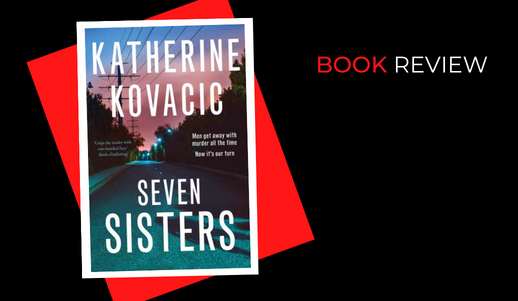By Katherine Kovacic
Publisher/Year: HarperCollins Australia/2022
Publisher’s blurb
Men get away with murder all the time. Now it’s our turn … A twisty, intriguing crime novel for fans of The Mother and The Family Doctor.
Naomi started grief counselling prepared to run for cover as soon as her therapist, Mia, pulled out a crystal or tried to align her chakras.
When Mia suggests that she join a support group, Naomi is sceptical: how could she begin to describe what it felt like to lose her sister, Jo? How could she possibly share her loss and rage to a room full of people? How could she express her helplessness that Jo’s killer walks free on a suspended sentence?
And how could she share her deepest desire to see Jo’s killer dead by her hand?
In the group sessions, Naomi finds that her experiences and her anger are shared between the other members: Gabrielle, Brooke, Katy, Olivia and Amy. Under the enigmatic leadership of Mia, a plan begins to take shape.
I’ll kill yours if you kill mine …
Reviewer 1: Moraig Kisler
Oh, Katherine Kovacic – you dastardly evil woman! Seven Sisters might well be the impetus for a handbook ‘Novel ways to murder men who truly deserve it.’ Seven Sisters is a cracker of a read. Revenge is sweet and, worryingly, my vicarious pleasure at the creative and satisfying ways in which Kovacic dispenses with perpetrators of domestic violence had me smiling with sadistic glee.
But there is more to the book than the sweet savour of revenge. Seven Sisters is a thriller for our time when so many women are killed by intimate partners, and those women who do stand up to such men are often convicted of crimes themselves. Kovacic explores the hurt, grief and desire for revenge from the point of view of those devastated by loss. Kovacic should be applauded for deftly juggling so many characters.
I loved Kovacic’s Alex Phelan art series mysteries, and Seven Sisters, a stand-alone novel, also doesn’t disappoint.
In homage to Hitchcock’s Strangers on a Train, six clients of psychologist/trauma counsellor Mia, who have each lost sisters to domestic violence, meticulously plot seven murders. And the methods of despatch are intriguing.
‘These men don’t change. The police try – well some of them do – but again and again the system lets the women down. Someone has to take care of the problem. Why not us?’
The Greek Myth of The Pleiades is a metaphor threaded through Seven Sisters. Mia’s practice is aptly named The Pleiades after the seven sister-nymphs, daughters of Atlas who are turned into a cluster of stars and pursued across the night sky by Orion the hunter. Some versions of the myth have the sisters suiciding, unable to stand the grief of their father’s plight. And in Seven Sisters the surviving sisters are pursed by grief and rage at the death of loved ones.
Seven Sisters is a must thriller. Although I don’t condone murder, I finished the novel a little conflicted that I was so satisfied at seven well-deserved murders. Brava, Katherine Kovacic!
Seven Sisters :HarperCollins Australia
Reviewer 2: Rachel Le Rossignol
Naomi’s sister was killed by her abusive partner, and Naomi is undergoing therapy to deal with her grief. When her therapist, Mia, invites her to attend a support group, she is highly sceptical, but quickly discovers they are all ‘sister survivors’ with similar experiences of having lost a loved one to intimate partner violence. Naomi quickly bonds with the others over their shared grief and anger at the injustice that all the perpetrators faced minimal or even no consequences.
Things take a sharp turn when Mia tells them what she sees as the true common denominator between them: that they’re all angry enough to act. Every person in the group is open to the idea of taking revenge on the person who killed their sister. Mia proposes that if they swap victims with each other (along the lines of Hitchcock’s ‘Strangers on a Train’) there won’t be any way to connect the crimes to those with obvious motives.
Katherine Kovacic’s previous books have been fascinating, lightly fictionalised or retellings of true Australian crimes (The Portrait of Molly Dean and The Schoolgirl Strangler) so she is walking a new path with Seven Sisters, but her skills in establishing pace, atmosphere and believable scenarios work equally as well here. From Naomi’s first session with Mia the pace is swift, and it’s intriguing to see how the various murders play out. Each woman’s approach to her mission is different, but all are believable. Settings are vividly realised, from an outback mining town to a luxury yacht on Sydney harbour – you feel immersed in them as though you were there.
At first the women in the therapy group are ciphers, known and defined only by their personal family tragedy, but as the story progresses the reader comes to know them through the emotional burdens they carry, how they act, and how they respond to the series of murders. It’s a satisfying, smart way of building character that works extremely well.
At first the murders seem to be going without any hitch or barrier, but the tension ramps up as a female policewoman starts wondering about the spate of apparently unconnected accidental deaths. She has been keeping a list of perpetrators or intimate partner violence who have got away with the deaths of their partners, so she quickly notices a pattern. But can she outsmart Mia and the group of women?
Seven Sisters is an action-packed, thought-provoking read that asks the question, ‘how far would you go to see justice done?’
